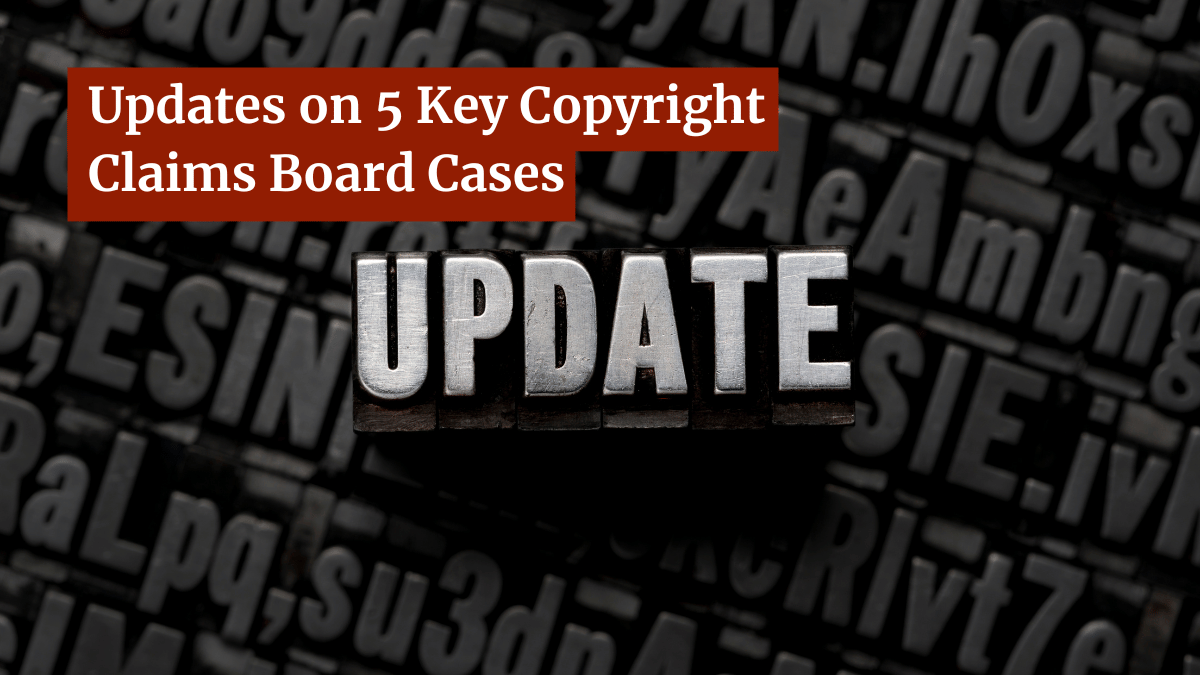Updates on 5 Key Copyright Claims Board Cases

Launched in June 2022, the Copyright Claims Board (CCB) is something of an ongoing experiment in providing a solution that enables rightsholders to pursue smaller cases of alleged copyright infringement without going through the time and expense of filing a full federal copyright complaint.
Since the launch, I’ve been following the CCB very closely, doing a deep dive into its first 100 cases, highlighting some of the most common claimants, including Joe Hand Promotions and Games Workshop, and highlighting cases where the board has issued a final judgement of one kind or another.
I’ve also been watching the cases that come in and highlighting cases that may become important for the CCB. This includes one article in September 2022 and another in May 2023.
However, there are key updates to some of those cases, making it well worth catching up on what is going on with some of the CCB’s most interesting cases.
1: 22-CCB-0244: Grand United Order of Oddfellows in American and Jurisdiction v. Cannon
Filed in November 2022 and first covered here in the May 2023 post, the case involves the Grand United Order of Oddfellows (GUOOF), who filed the case against a former member, Shawn O’Cannon.
Though the GUOOF filed the case, it’s actually O’Cannon who is claiming infringement. According to him, he created a book for the GUOOF entitled A Compilation of books of the Grand United Order of Odd Fellows. However, he alleges that the GUOOF then made unauthorized copies of his work and distributed them to members.
According to the GUOOF, the book was created with material that was either in the public domain or created by members of their group. O’Cannon, however, argued that he owned the rights to the compilation itself and to the original work he added to it.
The case was definitely getting into the thornier issues of copyright law, including the ownership of a compilation and questions around how much original material one needed to add to hold a copyright.
That made it a case to watch, as most CCB cases deal with more straightforward questions.
What’s New
The case has been on pause since late July. The reason is that both sides are seeking to reach a settlement rather than let the board make the determination for them.
To date, the CCB has granted three separate orders to stay proceedings as the negotiations continue. The latest was granted just last week and stays proceedings until October 30, 2023.
Although the settlement process has been taking several months, it seems like the most likely outcome in this case.
2: 22-CCB-0093: Markham v. Horton Records, LTD.
This case was filed in August 2022 by songwriter Jimmy Markham, who filed the claim against Horton Records. According to Markham, the labels released covers of two of his songs, Black Cherry and Desiree, without paying the necessary royalties.
Horton Records, for their part, claimed that they obtained the licensing through Easy Song Licensing and even declared how much they had paid. The company went on to say that any issues with final payment were likely due to bad metadata or other information.
The case had the potential to be an interesting one, as the CCB could delve into music licensing and the issues that the Music Modernization Act of 2017 was intended to fix.
Horton Records also claimed that the songs were works of joint authorship and that, without his coauthor, he didn’t have standing in the case.
What’s New
When I published the May 2023 article, Horton Records had just posted their response to the claim. However, shortly after that, the two sides asked for a stay in proceeding and ultimately reached a settlement.
That settlement was filed in September 2023 and resulted in the case being dismissed with prejudice. The CCB never weighed in on any of the issues that the case raised.
3: 22-CCB-0008: Corjulo v. Mandrell
This case is less known for its interesting facts, but more for its drawn out nature.
The case was originally filed in June 2022 and was only the eighth case filed in the CCB’s history. It pitted a photographer, Daniel C Corjulo, who claims that the respondent, Scott Mandrell, used images he took from a trip down the Mississippi River without authorization.
However, Mandrell proved to be uncooperative. This including refusing service, not attending required conferences, and only averting a default by filing a last-minute response in April 2023.
When we last looked at the case in May, Mandrell had just filed the response. The case raised various issues, including a question about the statute of limitations as Corjulo was alleged to have learned of the infringement in 2016, well over the three-year time frame for filing such a complaint.
What’s New
To be frank, the case has continued to drag. Though Mandrell filed his response in May, issues and questions over discovery mean that the case hasn’t seen any real progress.
Though Corjulo has filed (or rather refiled) much of his evidence, Mandrell has until October 23, 2023 to submit his response testimony and evidence.
While this case is now being actively contested, that doesn’t mean that we are speeding toward any kind of resolution or that we should expect one any time soon.
4: 22-CCB-0112 – Paramount Pictures Corporation v. JMC Pop Ups LLC
We looked at this case in a full article in September 2022. It marks the rare occasion that a major media company, Paramount in this case, filed a claim with the CCB alleging infringement by a third party.
That party was JMC Pop Ups (JMC), a company that hosted a series of pop up restaurants that were based on the McDowell’s brands from the two Coming to America movies.
Paramount alleged that the events were infringements of their copyright, while JMC alleged that none of the similarities between the two were protectable under copyright law.
When we first updated this case in April, both sides had filed a motion to stay proceedings as they were working to reach a settlement. The CCB had not yet weighed in on any of the legal or factual issues debated in the case.
What’s New
And they still haven’t. In fact, the only thing that is new is that we are now on our sixth stay of proceeding, not our first. That stay was granted in September 2023 and puts a pause on the case until October 16, 2023.
While settlement is still the most likely outcome of this case, it’s still interesting that the process has taken over six months, and it is the only case before the CCB that has seen this many stays in the proceeding.
5: 23-CCB-0193 – Richard B. Cass and Braniff Airways, Incorporated v. Collin L. Ice
I featured this case in a full article in June 2023 because the question raised in the case was interesting: If/How does copyright apply to flight cockpit recorders?
The case dealt with an airplane crash that took place on May 3, 1968. That was when Braniff International Airways Flight 352 crashed in Texas, killing all 80 passengers and 5 crew on board.
According to the claim, in April 2023, ahead of the 55th anniversary of the crash, the Fort Worth Star-Telegram released the cockpit recording from the crash a transcript made from that recording. Braniff claimed that this leak was harmful for the friends and family of those who lost their lives.
As such, they filed a claim with the CCB. However, even then, I noted that there were serious issues with the case, including a respondent whose connection to the alleged infringement was unclear, issues over who was the claimant in the case and questions over who owned the transcript.
It seemed unlikely that, without serious revision, that the case would go anywhere, despite the interesting questions being asked.
What’s New
I wasn’t the only one who noticed the issues with the claim. The CCB quickly ordered Braniff to amend the claim due to noncompliance. Specifically, the CCB wanted clarification on both the claimant and the respondent, as well as additional information about the allegedly infringed material and the infringement itself.
However, that wasn’t what ended up doing the case in.
Braniff submitted the recording for a copyright registration at roughly the same time they filed the claim. While that is permissible under CCB rules, the US Copyright Office refused to register the work.
The reason is that it was first published between 1964 and 1977, meaning that it may be eligible for a renewal registration, but not a new one. That prompted the board to dismiss the claim without prejudice.
Bottom Line
While copyright watchers love it when courts rule on complicated issues and clarify murky areas of the law, it’s something that rarely happens. Negotiation is a major part of all litigation and, even in cases where difficult questions are asked, it’s usually best for both parties to reach a settlement rather than move to trial.
It’s also common for cases to be decided on factors that are unrelated to the difficult questions. This can include technicalities or other issues with a case beyond the “interesting” copyright bits.
In that regard, the CCB a good analogy to the courtrooms. As of this writing, the CCB has only issued a ruling in one contested case and four default judgements. However, over 25 cases have been concluded with a settlement and, as we discussed previously, many more have been dismissed for various reasons.
What does make the CCB different is simply that it is so new. The board is basically a blank slate, and no one really knows how it is going to rule on any particular issue. Even though the CCB is meant to lean heavily on the rulings of the courts, there’s still a great deal of uncertainty.
Though we are seeing more and more cases reaching a head, it’s still going to be some time before we have a clear picture of how the CCB decides its cases.
Until then, we’re likely to continue to watch as many interesting cases never make it to the board itself. A trend that regular court watchers can definitely relate to.
Want to Reuse or Republish this Content?
If you want to feature this article in your site, classroom or elsewhere, just let us know! We usually grant permission within 24 hours.
